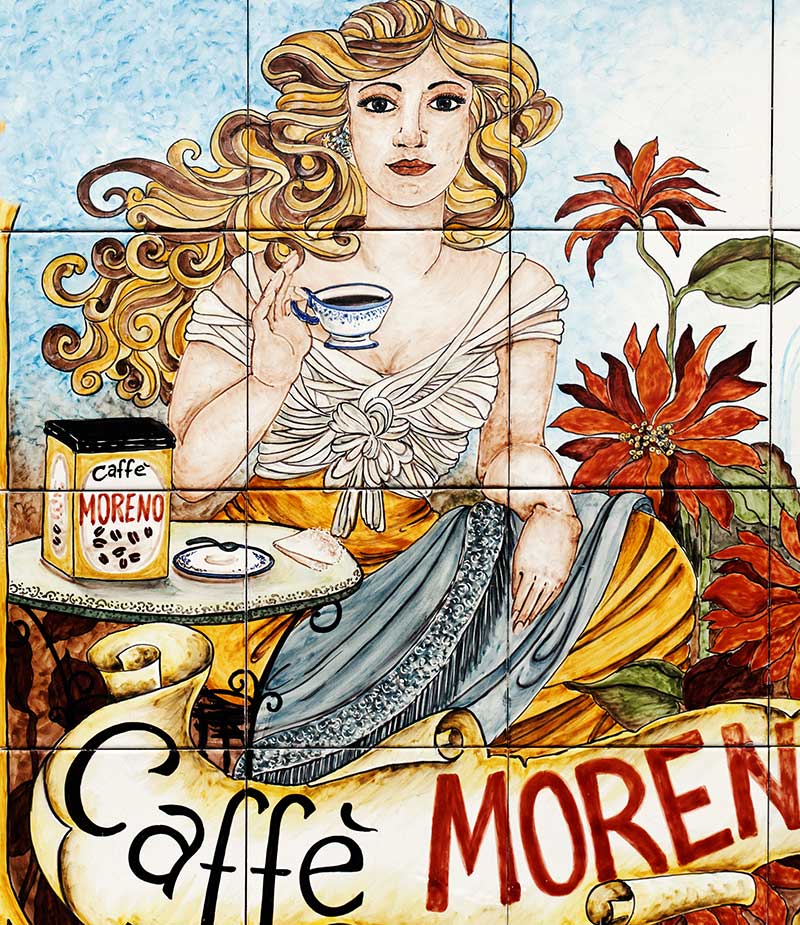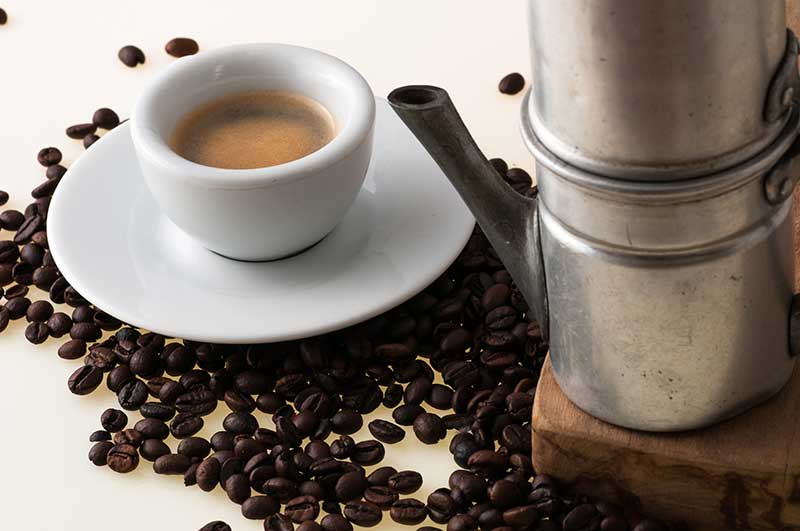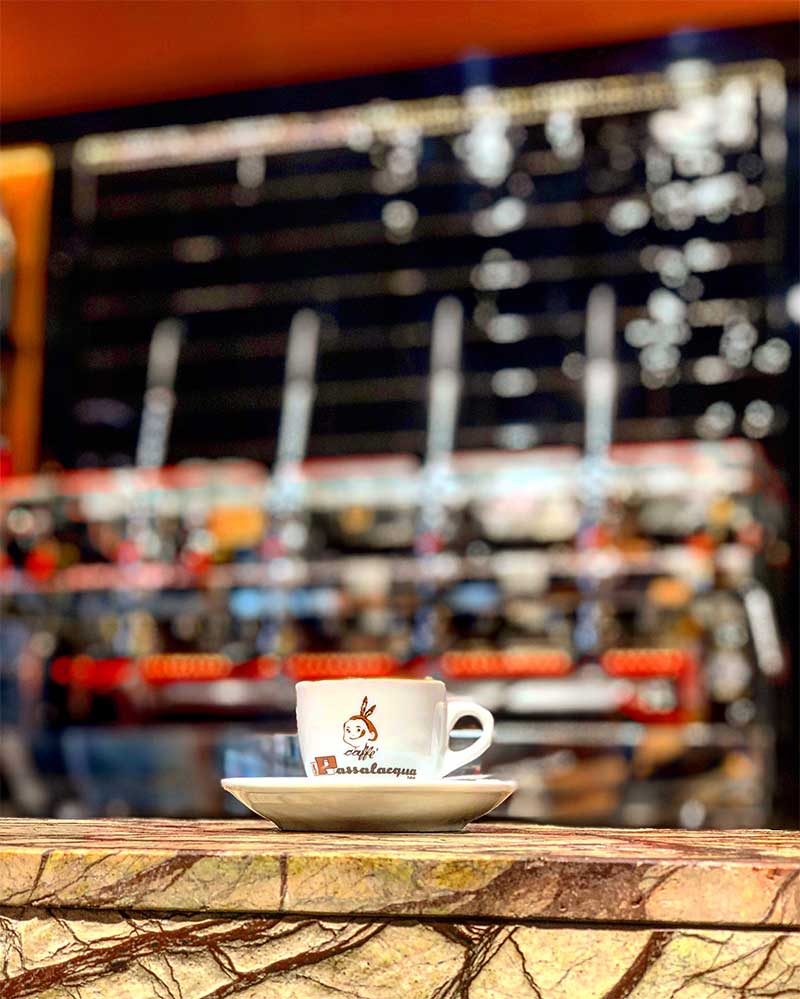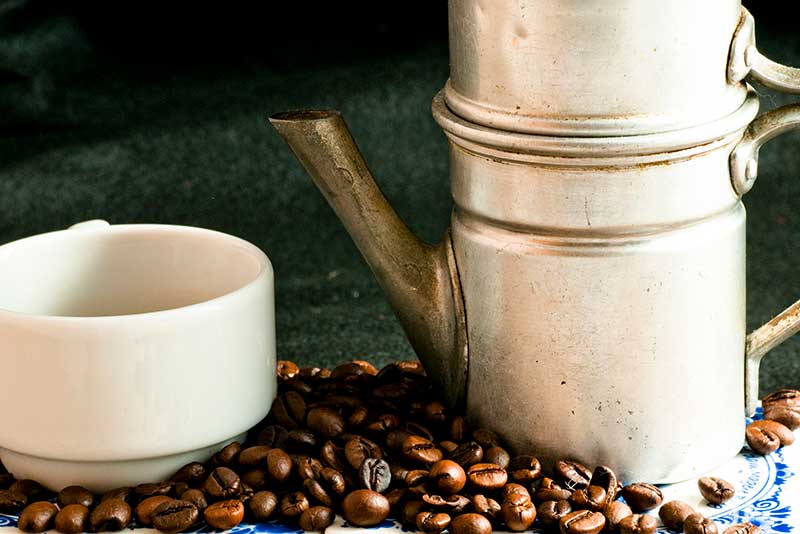The relationship between caffé and the city of Naples can only be called love. La tazzulella di caffé is the way Neapolitans welcome the day, recharge throughout it and show friends they enjoy their company. It is the occasion to socialize, share opinions and discuss about the latest news and gossip.
Not much different from what happens in the rest of Italy, you may say. And, under many points of view, you’re right. In Italy, coffee is not only a way to perk up during a particularly sluggish morning, it’s part of the culture, from North to South. But in Naples… in Naples coffee is sacred: from the choice of the right blend, to the machines used to make it, all the way to how it is served, a cup of coffee is never “simple” here: it’s a labor of love, craftsmanship and traditions that verges on the religious.
And this is fantastic.

Legends say that it was a Roman musicologist, Pietro della Valle, to introduce coffee to the streets of Naples. Della Valle, apparently brought back kahve to Naples from Jerusalem, where he had lived for a numbers of years. Others maintain that the precious brew was brought to the city around the mid-15th century via Salerno, home to the first university of medicine in the Western world.
In spite of these possible early encounters with it, Naples fell in love with coffee relatively late, especially when compared with other European cities like Wien and Venice. At the beginning of the 19th century, caffettieri ambulanti, street coffee vendors, were a fixture in Naples: people would gather around them, get their coffee and socialize in simplicity.
It is, however, in the 20th century that Naples truly turned into the “city of coffee,” also thanks to the birth of many cafés — i bar, as we call them in Italy — that became themselves symbols of the loving relationship between the city and kahve, cafés that are, today, real icons of Neapolitan life.

A collection of mokas: the most traditional way to make coffee at home, also in Naples
L’Italo Americano had the luck to chat with the owners of two such institutions: Errico Castagnola, second generation owner and manager of Bar Mexico, and Massimiliano Ciorfito who, along with his brother Raffaele, has been successfully running Caffé Ciorfito since 1990. With them, we didn’t only discuss the history and development of their businesses, but also Naples’ undeniable love for coffee, and the uniqueness of Neapolitan coffee culture, in all its facets.

Both the Ciorfitos and the Castagnolas come from a long tradition of coffee making. Brothers Massimiliano and Raffaele, for instance, may have “only” opened their café in 1990, but their father, Massimiliano tells us, “was a talented barista, with more than 50 years experience.” Bar Mexico has been open since 1948, and its history, as told by Errico Castagnola, tells a lot about the history of coffee culture in the city: “our café opened in 1948 and it has been always associated with the Passalacqua blend. We went for ‘Bar Mexico’ because, in those years, it was customary to name cafés that also roasted their coffee after the South-American country they’d get their raw beans from. For instance, you may be familiar with Caffé Kimbo (a popular Neapolitan coffee blend you can find also at the supermarket), whose original name was ‘Café do Brazil.’”

Love for coffee and expertise in how to make it clearly runs in the Castagnolas and the Ciorfitos’ blood, but why are Neapolitans as a whole considered the real coffee connoisseurs of Italy? Massimiliano Ciorfito explains it to us: “In my opinion, Neapolitans are real experts when it comes to good coffee. Every time they go to a café, they check the barista and his work out and, if they like what they drink, you’ll hear them say ‘ah! This is a good coffee!’ And if it’s a really outstanding brew, they no longer leave you: at Caffé Ciorfito, we’ve had customers coming to us for the past 30 years!”
But Neapolitans, Ciorfito continues, didn’t gain their coffee knowledge only through observation, but also through consumption: “Neapolitans drink at least 5 or 6 coffees a day so, in time, they become real connoisseurs.” Just for your information, a recent Nielsen research states that Italians drink 1.5 cups of coffee per capita every day, although I am sure there are plenty of people around the country who edge closer to Neapolitan numbers. Yours truly included, as a matter of fact!

Many are the blends you can find in Naples: Passalacqua is served at Bar Mexico
Coffee is an immense pleasure for Neapolitans and, for this reason, it has to be good. A little gem, a gold nugget, a delicacy available and accessible to all. As simple a pleasure as it may be, your Neapolitan tazzulella involves much more work that you’d expect and that ’s why, probably, coffee in Naples just tastes so incredible. Bar Mexico’s Errico Castagnola underlines the importance of using only freshly ground coffee and of serving coffee in a certain way: “our caffettieri use powerful coffee grinders and small steel spoons to grind coffee beans and prepare single portions for each of our customers. It’s a methodic work, that needs loads of perseverance but, for us, coffee beans can’t give their best if they’re not freshly ground. Using already-ground coffee is very wrong: you loose the best a blend has to offer.”
Errico also tells us about the very specific way coffee is served in Naples, a way that often leaves travelers from other parts of Italy a tad confused: “Our coffee is served with sugar and in a hot cup. This is typical of Naples and mostly unknown in the rest of Italy.” So, if you like your brew bitter, make sure you say it to your Neapolitan barista before hand.
But the uniqueness of Neapolitan coffee culture is not only a matter of flavors and brewing methods, it also involves Naples’ proverbial big heart. Enters the caffé sospeso, or “suspended coffee,” the practice to pay for an extra coffee when you go to get yours, so that someone who can’t pay can enjoy a tazzina anyway. While the caffé sospeso habit has been popping up here and there in other parts of Italy, in Naples is traditional, as Massimiliano of Caffé Ciorfito tells us: “We’ve been doing caffé sospeso for years in our café but, recently, we’ve upgraded the way we do it. Usually, customers wishing to leave a paid coffee for someone get a receipt with a sticker saying ‘sospeso’ on it. They then give it to the barista at the counter, who places them all behind his work station. If someone comes and can’t pay for their coffee, then the barista takes down one of the paid receipts and tells the customer his cup is offered by someone else.

“But because not everyone is ok with admitting they can’t pay, we organized things a bit differently: we keep a daily toll of all the caffé sospeso’s receipts, find out how much money they are worth and we send that amount doubled to the hostel for the homeless just around the corner. We double the sum because we, as Caffé Ciorfito, want also to do our bit.”
The world of Neapolitan coffee is made, we have seen, of tradition, of dedication, of passion and of that quintessential heartwarming goodness typical of the people of Naples. That’s why the tazzulella is so much more than a mere drink, and that’s why Neapolitan coffee does not only taste good, it also is a good thing. It’s important, then, tells us Errico Castagnola, to bring its history, tradition and craftsmanship to the rest of Italy, so much so that Bar Mexico opened up two Milanese branches under the name Expresso Napoletano. There, just like in the original Bar Mexicos in Naples (there is more than one there, too), tradition and quality are at the heart of business: “we still love coffee with the same care and quality of the past” says Castagnola, “we support, in other words, tradition. We sell our blends in our cafés, rigorously ground on order, of course, so our customers can experience their unique aroma even before they get home.”
If our chat with Massimiliano and Errico thought us something is really that, in Naples, coffee is a serious affair: nothing is done by chance, everything, from the moment when the beans are ground, to the way the drink is served, follows specific rules, rules bound to a past made of history and travels, of street vendors and legendary characters.
Neapolitan coffee in the end, is not that different from the people of its city: attached to its roots, iconic, bold and with a big heart.
The two cafés featured in this article are:
Caffé Ciorfito, Via San Biagio dei Librai, 90, Naples.
Bar Mexico, Piazza Dante, 86 and Piazza Garibaldi, 72, Naples.
La relazione tra il caffè e la città di Napoli non può che essere d’amore. La tazzulella di caffé è il modo in cui i napoletani accolgono il nuovo giorno, si ricaricano e mostrano agli amici che amano la loro compagnia. E’ l’occasione per socializzare, condividere opinioni e parlare delle ultime notizie e fare pettegolezzi.
Non molto diversamente da quanto accade nel resto d’Italia, si potrebbe dire. E, sotto molti punti di vista, avete ragione. In Italia, il caffè non è solo un modo per tirarsi su in una mattina particolarmente pigra, ma fa parte della cultura, da Nord a Sud. Ma a Napoli…… a Napoli il caffè è sacro: dalla scelta della giusta miscela, alle macchine con cui viene preparato, fino al modo in cui viene servito, una tazza di caffè non è mai “solo una tazza di caffè”: è una questione d’amore, artigianato e tradizioni che rasenta la religione.
E questo è fantastico.
Le leggende dicono che fu un musicologo romano, Pietro della Valle, a introdurre il caffè nelle strade di Napoli. Della Valle, a quanto pare ha portato il “kahve” da Gerusalemme, dove aveva vissuto per diversi anni, a Napoli. Altri sostengono che la preziosa miscela fu portata in città intorno alla metà del XV secolo via Salerno, sede della prima università di medicina del mondo occidentale.
Nonostante questi possibili primi incontri, Napoli si innamorò del caffè relativamente tardi, soprattutto se la si paragona ad altre città europee come Vienna e Venezia. All’inizio del XIX secolo, i caffettieri ambulanti erano un appuntamento fisso a Napoli: la gente si riuniva intorno a loro, prendeva il caffè e socializzava in semplicità.
Sarà nel Novecento che Napoli si trasforma nella “città del caffè” vera e propria, anche grazie alla nascita di molti caffè – i bar, come li chiamiamo in Italia – che diventano essi stessi un simbolo del rapporto d’amore tra la città e i kahve, i caffè che sono, oggi, vere e proprie icone della vita napoletana.
L’Italo Americano ha avuto la fortuna di chiacchierare con i proprietari di due di queste istituzioni: Errico Castagnola, proprietario di seconda generazione e direttore del Bar Mexico, e Massimiliano Ciorfito che, insieme al fratello Raffaele, gestisce con successo il Caffè Ciorfito dal 1990. Con loro non abbiamo discusso solo della storia e dello sviluppo delle loro attività, ma anche dell’innegabile amore di Napoli per il caffè e dell’unicità della cultura del caffè napoletano in tutte le sue sfaccettature.
Sia i Ciorfito che i Castagnola hanno alle spalle una lunga tradizione familiare. I fratelli Massimiliano e Raffaele, per esempio, possono aver aperto il loro caffè “solo” nel 1990, ma il loro padre, ci dice Massimiliano, “era un barista di talento, con più di 50 anni di esperienza”. Il Bar Messico invece è aperto dal 1948 e la sua storia, come racconta Errico Castagnola, dice molto della storia della cultura del caffè in città: “Il nostro caffè ha aperto nel 1948 ed è sempre stato associato alla miscela Passalacqua. Abbiamo scelto ‘Bar Messico’ perché, in quegli anni, andava di moda chiamare i caffè che tostavano le loro miscele come il paese sudamericano da cui acquistavano i chicchi crudi. Ad esempio, se conoscete il Caffè Kimbo (una popolare miscela di caffè napoletano che si trova anche al supermercato), il nome originale era Café do Brazil”.
L’amore per il caffè e il saperlo preparare scorre chiaramente nel sangue dei Castagnola e dei Ciorfito, ma perché i napoletani sono generalmente considerati i veri intenditori di caffè in Italia? Ce lo spiega Massimiliano Ciorfito: “A mio avviso, i napoletani sono dei veri esperti quando si tratta di buon caffè. Ogni volta che vanno al bar, controllano il barista e il suo lavoro e, se gli piace quello che bevono, li sentirai dire ‘Ah! Questo è un buon caffè! E se si tratta di una miscela davvero eccezionale, non ti lasciano più: al Caffé Ciorfito abbiamo clienti che vengono da 30 anni!”
Ma i napoletani, continua Ciorfito, non hanno acquisito la conoscenza del caffè solo con l’osservazione, ma anche attraverso il consumo: “I napoletani bevono almeno 5 o 6 caffè al giorno, così, col tempo, diventano dei veri intenditori”.
Giusto per informazione, una recente ricerca Nielsen afferma che gli italiani bevono 1,5 tazze di caffè pro capite al giorno, anche se sono sicura che ci sono molte persone in tutto il Paese che si avvicinano ai numeri napoletani. Sottoscritta inclusa, a dire la verità!
Il caffè è un piacere immenso per i napoletani e, per questo motivo, deve essere buono. Un piccolo gioiello, una pepita d’oro, una prelibatezza disponibile e accessibile a tutti. Per quanto semplice possa essere il piacere, la vostra tazzulella napoletana comporta molto più lavoro di quello che vi potreste aspettare e per questo, probabilmente, il caffè ha un sapore così incredibile a Napoli.
Errico Castagnola del Bar Mexico sottolinea l’importanza di utilizzare solo caffè appena macinato e di servire il caffè in un certo modo: “I nostri caffettieri utilizzano potenti macinacaffè e mestolini d’acciaio per macinare i chicchi di caffè e preparare singole porzioni per ciascuno dei nostri clienti. E’ un lavoro metodico, che richiede molta perseveranza ma, per noi, i chicchi di caffè non possono dare il meglio se non sono stati appena macinati. Utilizzare caffè già macinato è sbagliatissimo: si perde il meglio che una miscela ha da offrire”.
Errico ci parla anche del modo molto caratteristico in cui viene servito il caffè a Napoli, un modo che spesso lascia un po’ confusi i viaggiatori provenienti da altre parti d’Italia: “Il nostro caffè viene servito con lo zucchero e in una tazzina bollente. Questo è tipico di Napoli e per lo più sconosciuto nel resto d’Italia”. Quindi, se vi piace la miscela amara, assicuratevi di dirlo subito al vostro barista napoletano.
Ma l’unicità della cultura del caffè napoletano non è solo una questione di sapori e metodi di preparazione, ma coinvolge anche il proverbiale grande cuore di Napoli. Il “caffé sospeso” è la pratica di pagare un caffè extra quando si prende il proprio, in modo che chi non può pagarselo possa comunque godersi una tazzina. Mentre l’abitudine del caffé sospeso è spuntata qua e là anche in altre parti d’Italia, a Napoli è una tradizione, come ci racconta Massimiliano del Caffé Ciorfito: “Nel nostro caffè serviamo il caffé sospeso da anni ma, recentemente, abbiamo migliorato il modo di offrirlo. Di solito, i clienti che desiderano lasciare un caffè pagato per qualcuno, ricevono una ricevuta con un adesivo che dice “sospeso”. La consegnano al barista al bancone, che mette tutti gli scontrini dietro la sua postazione di lavoro. Se qualcuno entra e non può pagarsi il caffè, il barista prende una delle ricevute di pagamento e dice al cliente che la sua tazzina è offerta da qualcuno”.
“Ma siccome non tutti vogliono dire che non possono pagare, abbiamo organizzato le cose in modo un po’ diverso: teniamo un conto giornaliero di tutte le ricevute del caffé sospeso, scopriamo quanto valgono e inviamo quella cifra raddoppiata al dormitorio per i senzatetto proprio dietro l’angolo. Raddoppiamo la somma perché anche noi, come Caffè Ciorfito, vogliamo fare la nostra parte”.
Il mondo del caffè napoletano è fatto, abbiamo visto, di tradizione, dedizione, passione e di quella bontà commovente tipica, per eccellenza, della gente di Napoli. Ecco perché la tazzulella è molto più di una semplice bevanda, ed è per questo che il caffè napoletano non solo ha un buon sapore, ma è anche una cosa buona. E’ importante, quindi, ci dice Errico Castagnola, portare la sua storia, la sua tradizione e la sua arte nel resto d’Italia, tanto che il Bar Mexico ha aperto due filiali milanesi con il nome di Expresso Napoletano. Lì, come nell’originale Bar Mexico di Napoli (ce n’è più d’uno anche a Napoli), tradizione e qualità sono al centro del business: “Continuiamo ad amare il caffè e ci mettiamo la stessa cura e la stessa qualità del passato”, dice Castagnola, “portiamo avanti, in altre parole, la tradizione. Vendiamo le nostre miscele nei nostri caffè solo su ordinazione, rigorosamente macinate al momento, così che i nostri clienti possano sperimentarne l’aroma unico già al momento dell’acquisto”.
Se la nostra chiacchierata con Massimiliano ed Errico ci ha insegnato qualcosa è che a Napoli il caffè è una cosa seria: niente è fatto per caso, e tutto, dal momento in cui i chicchi vengono macinati al modo in cui viene servita la bevanda, segue regole precise, regole legate ad un passato fatto di storia e viaggi, di venditori ambulanti e personaggi leggendari.
Il caffè napoletano, in fondo, non è poi così diverso dai napoletani stessi: legato alle sue radici, iconico, audace e con un grande cuore.
I due caffè citati in questo articolo sono:
Caffé Ciorfito, Via San Biagio dei Librai, 90, Napoli.
Bar Mexico, Piazza Dante, 86 e Piazza Garibaldi, 72, Napoli.



































